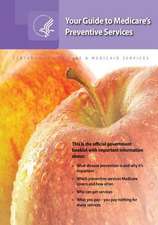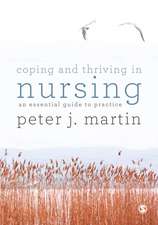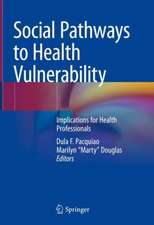Gender-Based Violence: A Comprehensive Guide
Editat de Parveen Ali, Michaela M. Rogersen Limba Engleză Paperback – 2 iun 2023
GBV can take many forms including female foeticide, infanticide, female genital mutilation, child marriage, grooming, trafficking, forced marriage, dowry- related abuse, honour-based violence, rape, sexual assault, stalking, harassment, street violence, abuse against older people, domestic violence, and intimate partner violence. It can take place in public, private and virtual settings, andwithin the context of intimate, familial, community and institutional relationships. While all these forms affect girls and women more, boys and men can also be exposed of various forms of violence including child abuse, sexual abuse, wartime violence, corporal punishment to name a few.
This book takes a unique approach and presents an overview of gender-based violence and related practices throughout the world. The book is written in a user friendly manner in order to be accessible as an introductory text to a wide range of readers including students, practitioners and researchers. Edited by a public health academic and a social worker, with contributions representing a wide range of disciplines, the book will appeal to many professions including nurses, midwives, social care and social work practitioners, police, teachers, psychologists, and sociologists.
Preț: 566.40 lei
Preț vechi: 596.21 lei
-5% Nou
Puncte Express: 850
Preț estimativ în valută:
108.40€ • 111.83$ • 91.74£
108.40€ • 111.83$ • 91.74£
Carte tipărită la comandă
Livrare economică 28 februarie-06 martie
Preluare comenzi: 021 569.72.76
Specificații
ISBN-13: 9783031056390
ISBN-10: 3031056396
Pagini: 632
Ilustrații: XVIII, 632 p. 2 illus.
Dimensiuni: 155 x 235 x 33 mm
Greutate: 1.21 kg
Ediția:1st ed. 2023
Editura: Springer International Publishing
Colecția Springer
Locul publicării:Cham, Switzerland
ISBN-10: 3031056396
Pagini: 632
Ilustrații: XVIII, 632 p. 2 illus.
Dimensiuni: 155 x 235 x 33 mm
Greutate: 1.21 kg
Ediția:1st ed. 2023
Editura: Springer International Publishing
Colecția Springer
Locul publicării:Cham, Switzerland
Cuprins
Foreword.- Part 1 Introduction. .- Chapter 1 . Understanding Gender-based Violence.- Chapter 2 . Theorising gender-based violence.- Part 2 Child Abuse. .- Chapter 3 . Child sexual exploitation and its impact.- Chapter 4 . Childhood sexual abuse.- Part 3 Intimate partner violence. .- Chapter 5. Forced marriage.- Chapter 6. Intimate partner violence.- Chapter 7. Economic abuse.- Chapter 8 . The intersection between domestic abuse, substance misuse and mental health problems.- Chapter 9 . Post-separation and divorce-related abuse.- Chapter 10 . Stalking.- Chapter 11 . Femicide.- Chapter 12. Familicide as a Form of Abuse.- Chapter 13. Widowhood .- Part 4 Non-partner sexual violence. .- Chapter 14. Exploring Rape as a Gender-Based Crime.- Chapter 15 . Sexual harassment: breastfeeding, design and the city.- Part 5 Harmful practices. .- Chapter 16. Acid attacks.- Chapter 17 . Bride abduction.- Chapter 18 . Colourism.- Chapter 19 . Dowry-related abuse and dowry death.- Chapter 20. Femalegenital mutilation.- Chapter 21. Honour crimes.- Chapter 22. Violence, Land, Gender: Exploring connections.- Chapter 23. Menstruation and gender-based violence.- Chapter 24. Spiritual abuse and gender-based violence.- Chapter 25. Wartime violence and intimate partner violence.- Part 6 Human Trafficking. .- Chapter 26 . Abuses against female migrant domestic workers in the UK: An intersectional approach.- Chapter 27 . Human trafficking.- Chapter 28 . Migration and gender-based violence.- Chapter 29. Sex work and sex trafficking.- Part 7 Institutional violence. .- Chapter 30. Obstetric violence.- Chapter 31. Pornography.- Chapter 32. Reproductive coercion and abuse.- Chapter 33. Workplace Harassment.- Part 8 Identity abuse. .- Chapter 34. Domestic Violence and Abuse in LGBTQ+ Communities.- Chapter 35. Older adult mistreatment.- Chapter 36. Violence against disabled people.- Part 9 Digital and technology-facilitated abuse. .- Chapter 37. Digital sexual assault: Understanding the non-consensual sharing of sexual images.- Chapter 38. Online text-based (sexual) abuse.- Chapter 39. Technology-facilitated abuse.- Part 10 Legal responses. .- Chapter 40. Domestic Violence: The Legislative Overview of South Asian Countries.- Chapter 41 . The international legal framework on gender-based violence.- Part 11 Conclusion. .- Chapter 42. Reflections and Way Forward.- Glossary of terms. .- Abbreviations.
Notă biografică
Professor Parveen Ali is a Professor of Gender Based Violence and has a joint position at the University and Doncaster & Bassetlaw Teaching Hospitals (DBTH). Prof Ali is a Fellow of Faculty of Public Health, Registered Nurse, Registered Nurse Teacher and Senior Fellow of Higher Education Academy. Prof Ali is Editor-in Chief of International Nursing Review and editorial board member of Journal of Advanced Nursing and Journal of Interpersonal Violence.
Prof Ali’s research focuses on gender-based violence especially intimate partner violence from the perspective of victims and perpetrators, health inequalities, consanguinity and genetics, and inequalities in health care experiences and health outcomes and how reparation and training of health professionals such as doctors, nurses, and allied health professionals can contribute to tackling such inequalities. She is a mixed method researcher and an expert in developing and delivering effective and interactive face to face and online learning material. She is the developer and lead educator of Supporting victims of domestic violence and domestic abuse training game. She has published widely on issues around GBV and how these effect individuals, families and communities and how service provisions to victim/ survivors can be improved.
Dr. Michaela Rogers (PhD (Sheffield), MA Social Work (MMU), PgCAP (Salford), BA (Hons) Social Sciences: Social Policy (MMU), SFHEA), is a registered social worker (Social Work England SW85402) and Senior Lecturer in Social Work at the University of Sheffield, UK. She is currently the Director of Education for the Department of Sociological Studies. Michaela has a professional and academic background in the field of social work and social care. Her practice experience ranges from statutory social work in safeguarding children and young people to voluntary sector management and frontline positions working with groups ofvulnerable people (for example, women and children escaping domestic abuse). Michaela’s research spans the areas of social care, social justice, equality, and diversity, safeguarding, interpersonal abuse and gender-based violence. These projects typically aim to explore social problems in terms of everyday experiences or assess the impact of service delivery or specific policy initiatives. For example, her work on gender-based violence and domestic abuse has a focus towards the experiences of marginalised groups (LGBTQ communities and older people) exploring the barriers and enablers to help-seeking and accessing support. Michaela has published widely on gender-based violence, domestic abuse and has published a number of books contributing to social work literature on skills and knowledge development for practice. Current research includes child-to-parent violence, elder abuse, technology-facilitated intimate partner abuse and the intersection of female offending, mothering and domestic abuse.
Prof Ali’s research focuses on gender-based violence especially intimate partner violence from the perspective of victims and perpetrators, health inequalities, consanguinity and genetics, and inequalities in health care experiences and health outcomes and how reparation and training of health professionals such as doctors, nurses, and allied health professionals can contribute to tackling such inequalities. She is a mixed method researcher and an expert in developing and delivering effective and interactive face to face and online learning material. She is the developer and lead educator of Supporting victims of domestic violence and domestic abuse training game. She has published widely on issues around GBV and how these effect individuals, families and communities and how service provisions to victim/ survivors can be improved.
Dr. Michaela Rogers (PhD (Sheffield), MA Social Work (MMU), PgCAP (Salford), BA (Hons) Social Sciences: Social Policy (MMU), SFHEA), is a registered social worker (Social Work England SW85402) and Senior Lecturer in Social Work at the University of Sheffield, UK. She is currently the Director of Education for the Department of Sociological Studies. Michaela has a professional and academic background in the field of social work and social care. Her practice experience ranges from statutory social work in safeguarding children and young people to voluntary sector management and frontline positions working with groups ofvulnerable people (for example, women and children escaping domestic abuse). Michaela’s research spans the areas of social care, social justice, equality, and diversity, safeguarding, interpersonal abuse and gender-based violence. These projects typically aim to explore social problems in terms of everyday experiences or assess the impact of service delivery or specific policy initiatives. For example, her work on gender-based violence and domestic abuse has a focus towards the experiences of marginalised groups (LGBTQ communities and older people) exploring the barriers and enablers to help-seeking and accessing support. Michaela has published widely on gender-based violence, domestic abuse and has published a number of books contributing to social work literature on skills and knowledge development for practice. Current research includes child-to-parent violence, elder abuse, technology-facilitated intimate partner abuse and the intersection of female offending, mothering and domestic abuse.
Textul de pe ultima copertă
This book provides comprehensive information about various types of gender-based violence (GBV) and abuse. GBV is a major public health and social problem that affects people, mostly women and girls, in every community, culture, and country. GBV refers to the violence or a pattern of abusive behaviours including physical aggression, sexual coercion, psychological abuse and controlling behaviours resulting in physical, sexual or psychological harm. It is associated with severe physical and psychological consequences, and can result in death. .
GBV can take many forms including female foeticide, infanticide, female genital mutilation, child marriage, grooming, trafficking, forced marriage, dowry- related abuse, honour-based violence, rape, sexual assault, stalking, harassment, street violence, abuse against older people, domestic violence, and intimate partner violence. It can take place in public, private and virtual settings, and within thecontext of intimate, familial, community and institutional relationships. While all these forms affect girls and women more, boys and men can also be exposed of various forms of violence including child abuse, sexual abuse, wartime violence, corporal punishment to name a few.
This book takes a unique approach and presents an overview of gender-based violence and related practices throughout the world. The book is written in a user friendly manner in order to be accessible as an introductory text to a wide range of readers including students, practitioners and researchers. Edited by a public health academic and a social worker, with contributions representing a wide range of disciplines, the book will appeal to many professions including nurses, midwives, social care and social work practitioners, police, teachers, psychologists, and sociologists.
GBV can take many forms including female foeticide, infanticide, female genital mutilation, child marriage, grooming, trafficking, forced marriage, dowry- related abuse, honour-based violence, rape, sexual assault, stalking, harassment, street violence, abuse against older people, domestic violence, and intimate partner violence. It can take place in public, private and virtual settings, and within thecontext of intimate, familial, community and institutional relationships. While all these forms affect girls and women more, boys and men can also be exposed of various forms of violence including child abuse, sexual abuse, wartime violence, corporal punishment to name a few.
This book takes a unique approach and presents an overview of gender-based violence and related practices throughout the world. The book is written in a user friendly manner in order to be accessible as an introductory text to a wide range of readers including students, practitioners and researchers. Edited by a public health academic and a social worker, with contributions representing a wide range of disciplines, the book will appeal to many professions including nurses, midwives, social care and social work practitioners, police, teachers, psychologists, and sociologists.
Caracteristici
Offers a great comprehensive resource and provides useful guidance for practitioners Provides examples of practices happening in various parts of the world Provides a multidisciplinary approach




















